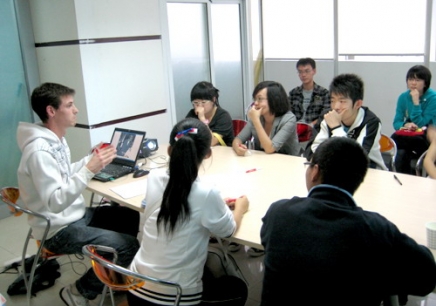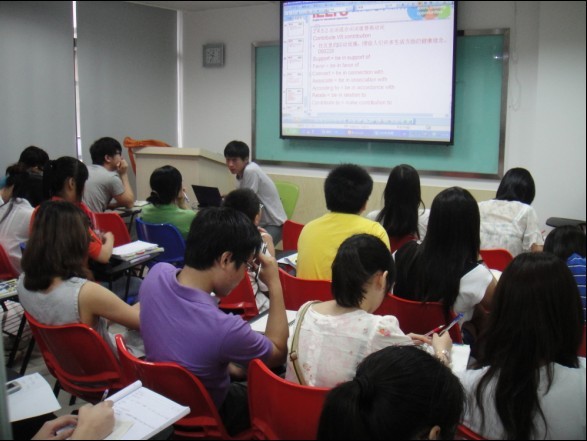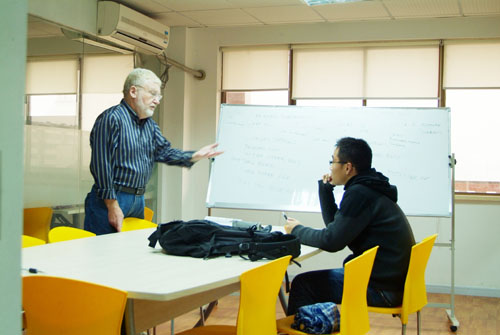 返回
教育头条
返回
教育头条

雅思写作范文
关于雅思,今天小编带来了写作技巧的小分享,希望对大家的学习有多帮助,预祝大家考试顺利!
It is not necessaryto travel to other places to learn about the other culture. We can learn asmuch from books, ?lms and the Internet.
To what extent do youagree or disagree?
这道题的难度其实并不大,因为与生活更贴近,可以定义为生活类结合学习类型一起攻克
题干一共三个关键词:学习文化,直接去当地,靠媒体
这个题目基本上学员都有明确的思路和想法,直接选择一边倒的写作手段就可以,因此,直接展开正文
首段
Globalization is an inevitable andunstoppable march that influence every individual in most societies; thus,cultural interaction has, unprecedently, been rigorously promoted under thetrend. In this case, understanding and learning about other cultures can bevital. Some suggested that it is inevitable for us to take a tour in adifferent culture in person via which we can learn well about thecharacteristics of that cultural context. However, in my opinion, it is betterif we observe and experience through media outlets for its detailed elaborationand convenience.
BODY 1
Primarily, Media outlets,including but not limited to book, movies, and sources of information on theinternet can provide us the most specific details about one particular culturalbackground. When we spend a couple of weeks traveling in a region with theprospection to scrutinize and explore the traditions and local lifestyle, wemight have chance to visit museums and have a conversation with people in thatlocality. Whereas, in this short period of time, the things we can see and theinformation we can receive are still very limited and even entirely subjective,which cannot be a thorough representative of local people, education, politics,language, social value, and morality as well as lifestyle. However, when wehave the longing to explore and learn all these aspects with elaborating howmeticulously such a wide range of culture composed, watching the documentary,reading historical event, reading online database must be the best choice. Forexample, by watching documentaries produced by BBC, such as Africa, whichcovers most countries and most rural areas in the continent, we can find all the differences and the life from a wide range, no way can we dig out that muchif we only spend a month traveling all those countries. Simultaneously, we canabsolutely learn so much more in detail and more precision supplied byanthropologists, archeologists, and sociologists if we read many articles published in Scientific American or New York Times about the little ice age or the political reforms in the past a few centuries, neither a sole museum nor a local council is on a par with media agencies.
BODY 2
On top of that, what makes a morecogent case for embracing the mass media is the convenience it brings to us.Traveling is sometimes, for many, an ideal expectation due to the limitationsin reality, hard finding time off from work, insufficient budget, thresholds inobtaining a valid visa, or language barriers, for instance. Mass media,however, can be available and accessible at any time in any location with Wi-Fiand an electronic device, off and on nowadays we might not have the internetaccess. Therefore, all sources of information and learning materials can beavailable by tapping and sliding on the screen. There are so many YouTubevideos, in which native video bloggers edited great episodes bombarding manyaspects of information introducing their countries and culture. Netflix,similarly, sponsors numerous documentaries, for the viewers to watch andprofoundly learn about how the outside world operates. All these are not onlyfun and effective learning materials, but more importantly, the most convenientway for us to get to know about other cultures.

结论段
In short, I would firmly benodding agreement with the claim that it is not necessitating to learn relatedcultural information by landing to that area. Instead, sufficient and effectiveinformation can always be found conveniently on the means of media. Also, it isnot always feasible to visit another country freely in order to catch up withthe demanding need of being knowledgeable and culturized in globalization.
It is not necessaryto travel to other places to learn about the other culture. We can learn asmuch from books, ?lms and the Internet.
To what extent do youagree or disagree?
这道题的难度其实并不大,因为与生活更贴近,可以定义为生活类结合学习类型一起攻克
题干一共三个关键词:学习文化,直接去当地,靠媒体
这个题目基本上学员都有明确的思路和想法,直接选择一边倒的写作手段就可以,因此,直接展开正文
首段
Globalization is an inevitable andunstoppable march that influence every individual in most societies; thus,cultural interaction has, unprecedently, been rigorously promoted under thetrend. In this case, understanding and learning about other cultures can bevital. Some suggested that it is inevitable for us to take a tour in adifferent culture in person via which we can learn well about thecharacteristics of that cultural context. However, in my opinion, it is betterif we observe and experience through media outlets for its detailed elaborationand convenience.
BODY 1
Primarily, Media outlets,including but not limited to book, movies, and sources of information on theinternet can provide us the most specific details about one particular culturalbackground. When we spend a couple of weeks traveling in a region with theprospection to scrutinize and explore the traditions and local lifestyle, wemight have chance to visit museums and have a conversation with people in thatlocality. Whereas, in this short period of time, the things we can see and theinformation we can receive are still very limited and even entirely subjective,which cannot be a thorough representative of local people, education, politics,language, social value, and morality as well as lifestyle. However, when wehave the longing to explore and learn all these aspects with elaborating howmeticulously such a wide range of culture composed, watching the documentary,reading historical event, reading online database must be the best choice. Forexample, by watching documentaries produced by BBC, such as Africa, whichcovers most countries and most rural areas in the continent, we can find all the differences and the life from a wide range, no way can we dig out that muchif we only spend a month traveling all those countries. Simultaneously, we canabsolutely learn so much more in detail and more precision supplied byanthropologists, archeologists, and sociologists if we read many articles published in Scientific American or New York Times about the little ice age or the political reforms in the past a few centuries, neither a sole museum nor a local council is on a par with media agencies.
BODY 2
On top of that, what makes a morecogent case for embracing the mass media is the convenience it brings to us.Traveling is sometimes, for many, an ideal expectation due to the limitationsin reality, hard finding time off from work, insufficient budget, thresholds inobtaining a valid visa, or language barriers, for instance. Mass media,however, can be available and accessible at any time in any location with Wi-Fiand an electronic device, off and on nowadays we might not have the internetaccess. Therefore, all sources of information and learning materials can beavailable by tapping and sliding on the screen. There are so many YouTubevideos, in which native video bloggers edited great episodes bombarding manyaspects of information introducing their countries and culture. Netflix,similarly, sponsors numerous documentaries, for the viewers to watch andprofoundly learn about how the outside world operates. All these are not onlyfun and effective learning materials, but more importantly, the most convenientway for us to get to know about other cultures.

结论段
In short, I would firmly benodding agreement with the claim that it is not necessitating to learn relatedcultural information by landing to that area. Instead, sufficient and effectiveinformation can always be found conveniently on the means of media. Also, it isnot always feasible to visit another country freely in order to catch up withthe demanding need of being knowledgeable and culturized in globalization.
谢谢你,阅读了这篇文章。我是教育宝学习顾问王敏,如何选择雅思是一个比较复杂的问题,雅思市场鱼龙混杂,广告铺天盖地,每家机构都把自己包装的天花乱坠,如何选择一家合适的机构?这是很多人都头疼的问题,选错机构不是费钱,而是浪费时间。教育宝始终保持中立客观,累计服务200万用户,致力于连接培训机构和学员,打造可靠、高效、让人放心的一站式互联网学习服务平台,如果你不知道雅思机构如何选,那么请让我来帮助你,加我微信:18560125702,我会根据你的实际需求,依靠8年从业经验,从海量课程中选择适合您的服务。返回教育宝头条
【免责声明】本文仅代表作者本人观点,与教育宝无关。教育宝对文中陈述、观点判断保持中立,不对所包含内容的准确性、可靠性或完整性提供任何保证。请读者仅作参考,特此声明!





